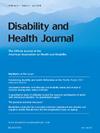Chronic conditions among transgender Medicare beneficiaries: Variation by race, ethnicity, and Medicaid dual-enrollment
IF 3.7
2区 医学
Q1 HEALTH CARE SCIENCES & SERVICES
引用次数: 0
Abstract
Background
Transgender and gender diverse (TGD) adults experience disability at twice the rate of cisgender (non-TGD) adults in the US. TGD people of color and low-income TGD people experience intersecting discrimination that may compound chronic conditions and disability. To our knowledge, no research has focused on chronic conditions among TGD Medicare beneficiaries with disabilities.
Objective
We compared the probability of chronic conditions among TGD adults with disability-based eligibility for Medicare across race, ethnicity, and dual Medicaid-Medicare enrollment.
Methods
We used cross-sectional Medicare enrollment and claims data between 2008 and 2017 for fee-for-service beneficiaries eligible based on disability. We applied a claims-based algorithm to identify TGD beneficiaries. We assessed differences in beneficiaries' age-adjusted predicted probability of chronic conditions across race, ethnicity, and dual eligibility.
Results
Dual-eligible TGD beneficiaries (N = 8041) had a higher predicted probability of nine out of ten health condition categories relative to Medicare-only TGD beneficiaries (N = 6237). For each race and ethnicity category, the most prevalent condition categories were mental health, cardiovascular conditions, and non-cardiovascular-related physical health conditions. Hispanic and non-Hispanic Black TGD beneficiaries had over two and three times the probability of infectious disease as non-Hispanic White TGD beneficiaries, respectively.
Conclusions
TGD adults with disabilities have high rates of chronic conditions with additional disparities by race, ethnicity, and dual eligibility status. Our findings offer potential directions for mixed-methods and intervention research aimed at identifying and ameliorating the drivers of these disparities among TGD Medicare beneficiaries with disabilities.
跨性别医疗保险受益人的慢性病:种族、民族和医疗补助双登记的差异。
背景:在美国,跨性别和性别多样化(TGD)的成年人经历残疾的比率是顺性别(非TGD)成年人的两倍。有色人种的TGD患者和低收入的TGD患者经历了交叉的歧视,这可能会加剧慢性疾病和残疾。据我们所知,没有研究集中在残疾的TGD医疗保险受益人的慢性疾病。目的:我们比较基于残疾的TGD成人在不同种族、民族和双重医疗保险登记中获得医疗保险资格的慢性疾病的概率。方法:我们使用2008年至2017年的断面医疗保险登记和索赔数据,用于基于残疾的服务收费受益人。我们采用基于索赔的算法来确定TGD受益人。我们评估了受益人年龄调整后的慢性病预测概率在种族、民族和双重资格方面的差异。结果:双重资格的TGD受益人(N = 8041)相对于仅医疗保险的TGD受益人(N = 6237)具有更高的10种健康状况类别中的9种预测概率。对于每个种族和族裔类别,最普遍的疾病类别是精神健康、心血管疾病和非心血管相关的身体健康状况。西班牙裔和非西班牙裔黑人TGD受益人患传染病的概率分别是非西班牙裔白人TGD受益人的两倍和三倍以上。结论:TGD成人残疾慢性疾病发生率高,且种族、民族和双重资格状况存在额外差异。我们的研究结果为混合方法和干预研究提供了潜在的方向,旨在确定和改善TGD医疗保险受益人中残疾的这些差异的驱动因素。
本文章由计算机程序翻译,如有差异,请以英文原文为准。
求助全文
约1分钟内获得全文
求助全文
来源期刊

Disability and Health Journal
HEALTH CARE SCIENCES & SERVICES-PUBLIC, ENVIRONMENTAL & OCCUPATIONAL HEALTH
CiteScore
7.50
自引率
6.70%
发文量
134
审稿时长
34 days
期刊介绍:
Disability and Health Journal is a scientific, scholarly, and multidisciplinary journal for reporting original contributions that advance knowledge in disability and health. Topics may be related to global health, quality of life, and specific health conditions as they relate to disability. Such contributions include:
• Reports of empirical research on the characteristics of persons with disabilities, environment, health outcomes, and determinants of health
• Reports of empirical research on the Systematic or other evidence-based reviews and tightly conceived theoretical interpretations of research literature
• Reports of empirical research on the Evaluative research on new interventions, technologies, and programs
• Reports of empirical research on the Reports on issues or policies affecting the health and/or quality of life for persons with disabilities, using a scientific base.
 求助内容:
求助内容: 应助结果提醒方式:
应助结果提醒方式:


